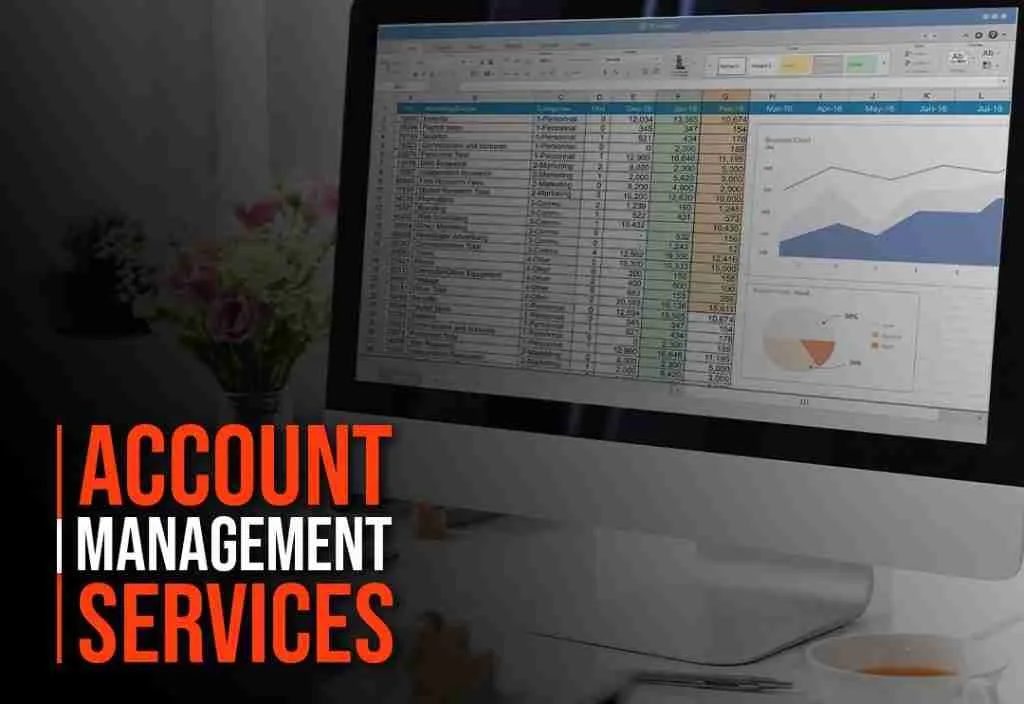Some small businesses hesitate to outsource bookkeeping because they don’t know where to start. Other small businesses put off outsourcing because they think it’s expensive.
If you’re one of these small business owners, your reservations are valid. But by looking at outsourcing more closely, you’ll understand why you need to outsource your bookkeeping and why it’s a good investment.
This article will give you a complete rundown to outsource bookkeeping for small business.
We’ll teach you how to get started and what to consider when looking for a service provider.
What Is Outsource Bookkeeping? Short Introduction

If you are new to the world of this digital realm, then you must be wondering what outsourcing bookkeeping is.
In simple words, it is hiring an external team of professionals that will take a burden off your shoulders.
Outsourced bookkeeping refers to the assigned task of daily recording financial activities and transactions of a company to an external service provider or a business process outsourcing (BPO) company.
An organization partners with an external bookkeeping service provider that can present it with qualified candidates. For example, you own a small business, and you’ve decided to outsource your bookkeeping. You have the final say on hiring the external bookkeeping staff recommended by the third-party service provider.
Furthermore, you have access to experienced and highly trained bookkeepers when you outsource this function for your small business. You can delegate day-to-day bookkeeping work, which may have been consuming significant time to complete, to your external team.
Outsource Bookkeeping for Small Business – What They Do
When you decide to outsource bookkeeping for your small business, they are responsible for managing your day-to-day tasks. It includes –
- Recording Transactions: They accurately record all financial transactions, including sales, purchases, payments, and receipts.
- Bank Reconciliation: They reconcile bank statements to ensure that your records match your bank’s records. They also identify any discrepancies that need to be addressed.
- Accounts Payable and Account Receivable: Managing invoices and ensuring timely payments to suppliers. Along with this, they even manage customer invoices and track payments received.
- Financial Reporting: Additionally, they prepare financial statements for your small business. Such as profit and loss statements, balance sheets, and cash flow statements. It offers insights into the financial health of your business.
- Tax Preparation Support: By outsourcing bookkeepers for your small business, you can get assistance with organizing financial data. They ensure compliance with tax regulations and ease the burden of tax preparation.
What Are the Factors that Affect the Cost of Outsourcing Bookkeeping Services?

- Services You Need: The first thing that affects the cost is what services you need. If you just need basic stuff like recording transactions, it’ll be cheaper than if you need more advanced services like tax preparation or financial analysis.
- How Often You Need Help: How often you need bookkeeping help matters too. If you need someone to check your books every day or week, it’ll cost more than if you only need help once a month or less often.
- How Complicated Your Business Is: The more complicated your business is, the more it’ll cost. If you have lots of different kinds of transactions or do business internationally, it takes more time and expertise, so it’ll cost more.
- How Big Your Business Is: The size of your business also plays a role. If you have a lot of transactions or a big operation, it’ll cost more than if you’re just starting or have a smaller business.
- Extra Stuff You Want: If you want extra services like tax planning or payroll processing, that’ll add to the cost. These are add-ons that you might not need but could be helpful.
- What Tools They Use: Some bookkeeping companies use fancy software or technology that costs more. They might charge more for these tools or offer extra services because of them.
- How Experienced They Are: The more experienced the bookkeeping company is, the more they might charge. If they have a lot of experience or specialize in certain industries, they might charge a higher rate for their expertise.
- Where They’re Located: Lastly, where the bookkeeping company is located matters too. If they’re in a big city with high costs, they might charge more. But if they’re in a smaller town or have lower expenses, they might be more affordable.
Major Tips to Consider Before Outsourcing Bookkeeping
- Reputation and Experience: First and foremost, research the reputation and experience of potential service providers. Always, seek recommendations and reviews from other small business owners in your area.
- Security Measures: Secondly, make sure that the outsourcing firm has robust security measures in place to protect the sensitive financial data of your small business.
- Communication Channels: Next, establish clear communication channels and protocols with them. It will ensure seamless collaboration and timely responses to queries or concerns if you have any.
- Customized Solutions for Your Unique Niche: Always, choose a service provider that offers tailored solutions to your business needs and goals. It should be flexible enough to accommodate changes or special business requirements.
- Cost Structure: In addition to these, try to understand the fee structure of the outsourcing service. In this case, make sure to consider additional charges for extra services or revisions, to avoid surprises down the line.
Questions to Ask Prospective Professional Bookkeeping Companies
However, questions may vary from business to business, or their niche and surroundings. But, here are the most common questions that you can ask before partnering with a team of bookkeeping-
- What is your experience working with small businesses in my niche or industry?
- Can you provide references from your past clients who have similar business needs?
- How do you ensure the security and confidentiality of my financial data?
- What communication channels will be available for ongoing updates and discussions?
- Are your services scalable enough to accommodate the growth of my business?
- What is your process for customizing services to align with the unique requirements of my business?
- Can you provide a breakdown of your pricing structure and any additional fees I should be aware of?
What is the Role of Technology in Outsourcing Bookkeeping Services?
- Cloud-Based Accounting Software: Many outsourced bookkeeping services leverage cloud-based accounting software like QuickBooks Online, Xero, or FreshBooks. These platforms allow real-time collaboration, secure data storage, and easy access from anywhere with an internet connection. Clients and bookkeepers can work on the same platform simultaneously, enhancing efficiency and accuracy.
- Automation: Technology enables automation of repetitive bookkeeping tasks such as data entry, invoice processing, bank reconciliation, and expense tracking. Automated processes reduce manual errors, save time, and free up resources to focus on more strategic financial activities.
- Data Security: Outsourcing bookkeeping services often involve sharing sensitive financial information. Advanced encryption, multi-factor authentication, and secure data centers provided by technology ensure data security.
- Data Analytics: Advanced reporting and data analytics tools integrated into accounting software allow businesses to gain insights into their financial performance. Outsourced bookkeepers can generate customized reports, forecast trends, and provide valuable financial analysis to help clients make informed decisions.
- Integration with Other Systems: Technology facilitates seamless integration between accounting software and other business systems such as CRM, payroll, inventory management, and e-commerce platforms.
- Remote Access and Communication: Technology enables remote access to financial data and efficient communication between clients and outsourced bookkeepers. Video conferencing, messaging apps, and collaboration tools facilitate real-time communication, ensuring transparency and timely resolution of queries.
- Scalability: Cloud-based accounting software and automated processes make outsourcing bookkeeping services scalable. Businesses can easily adjust the scope of services based on their evolving needs, whether it’s handling increased transaction volumes during peak seasons or expanding into new markets.
- Compliance and Regulation: Technology helps outsourced bookkeeping services stay updated with changing tax laws, accounting standards, and regulatory requirements. Automated compliance checks and reminders ensure that businesses remain compliant and avoid penalties.
Best Partner to Outsource Bookkeeping for Small Business in USA?
With the above-mentioned tips, you can make informed decisions when choosing one of the professionals.
However, to take a burden off your shoulders, we suggest you partner with Outsourcing Buddy for your small business bookkeeping needs.
They have a team of experts that will manage all your bookkeeping tasks, and accounting outsourcing tasks.
Their team of experts takes pride in their commitment to transparent transactions and proper communications. Furthermore, they keep their clients up to date by providing regular updates.
Contact their team and know their strategies and available solutions for your business bookkeeping needs.
Conclusion
Most of the time, small business entrepreneurs often find themselves inundated with multiple tasks, from overseeing daily operations to devising strategic growth plans.
Outsourcing bookkeeping services for small businesses has many benefits, from cost savings to enhanced efficiency scalability, and flexibility. It allows you to focus on driving growth and innovation in your business ventures.
However, for every small business owner, it is necessary to conduct proper research, assess their business needs, and choose a reputable service provider that aligns with their goals and values.
With the right outsourcing arrangement in place, small businesses can navigate the complexities of financial management with confidence and clarity.
Schedule a quick meeting with Outsourcing Buddy to get tailored solutions for your unique small business needs. Their experts will sit down with you and discuss all the aspects of bookkeeping-related work for your business.



Hi there! Do you know if they make any plugins to help with Search Engine Optimization? I’m trying to get my site to rank
for some targeted keywords but I’m not seeing very good success.
If you know of any please share. Appreciate it! I saw similar art here: Escape room
Hi! Thank you for your feedback. Yes, there are several SEO plugins to get your site rank. For more details, kindly reach out to us.
You actually make it appear so easy together with
your presentation however I in finding this topic to be actually one thing which I feel I might by no means understand.
It sort of feels too complex and very extensive for me.
I’m looking forward on your next put up, I’ll try to get the dangle of it!
Lista escape roomów
Thank you for your thoughtful comment! I am glad to hear you find the presentations clear and engaging. Some topics can indeed be complex and I am here to make them more approachable. Feel free to ask any questions.
Your article helped me a lot, is there any more related content? Thanks!
Thank you for your kind words. We are glad that our content helped you, you can visit our website for more related content.
You have noted very interesting points! ps nice website..
Thank you the compliment! We aim to be the best.
Your article helped me a lot, is there any more related content? Thanks!
Thank you for your feedback. I am glad this article helped you. For more related content, please visit our website.
The point of view of your article has taught me a lot, and I already know how to improve the paper on gate.oi, thank you.
Thank you for your feedback and for taking the time share your thoughts.
Thank you for your sharing. I am worried that I lack creative ideas. It is your article that makes me full of hope. Thank you. But, I have a question, can you help me?
Thank you for your kind words. Please feel free to ask you question, I’d be glad to help you.
Thank you for your sharing. I am worried that I lack creative ideas. It is your article that makes me full of hope. Thank you. But, I have a question, can you help me?
Thank you for your feedback. I’m glad you got the creative ideas through this post. Please feel free to ask your question, I’d be glad to answer to all your questions.
Thank you for your sharing. I am worried that I lack creative ideas. It is your article that makes me full of hope. Thank you. But, I have a question, can you help me?
Thank you for your kind words. Feel free to ask your question, I’d be glad to answer to all your questions.
I blog frequently and I really thank you for your content. This article has truly peaked my interest. I will book mark your site and keep checking for new details about once a week. I subscribed to your RSS feed as well.
Thank you for your kind words. I’m glad you found this article interested. Keep reading.
Your article helped me a lot, is there any more related content? Thanks!
Thank you for your kind words. For more related content, please visit our website.
Can you be more specific about the content of your article? After reading it, I still have some doubts. Hope you can help me.
Could you please elaborate what specific topic you’re looking for. Please elaborate, I’d try my best to help you out. Thanks!
Thank you for your sharing. I am worried that I lack creative ideas. It is your article that makes me full of hope. Thank you. But, I have a question, can you help me?
Thank you for your kind words. Please share your query, I’d be happy to help you out.
Thanks for sharing. I read many of your blog posts, cool, your blog is very good.
Thank you for sharing your feedback. This means a lot.
Thanks for sharing. I read many of your blog posts, cool, your blog is very good.
Thank you for the appreciation, It means a lot.
Thank you for your sharing. I am worried that I lack creative ideas. It is your article that makes me full of hope. Thank you. But, I have a question, can you help me?
Thank you for the positive feedback. Means a lot.
Your article helped me a lot, is there any more related content? Thanks!
For more related content, please visit our website. Thanks!
Can you be more specific about the content of your article? After reading it, I still have some doubts. Hope you can help me.
It would be helpful, if you could share what specific topic you are talking about. Thanks!
Can you be more specific about the content of your article? After reading it, I still have some doubts. Hope you can help me.
It would be great, if you could share what specific topic you’re looking for. I’d be happy to clear all your doubts. Thanks!
Thanks for sharing. I read many of your blog posts, cool, your blog is very good.
I’m thrilled to know that you liked our blog posts. Thanks for the feedback.
Thanks for sharing. I read many of your blog posts, cool, your blog is very good.
I’m thrilled to know that you found the articles helpful. Thanks for the appreciation.